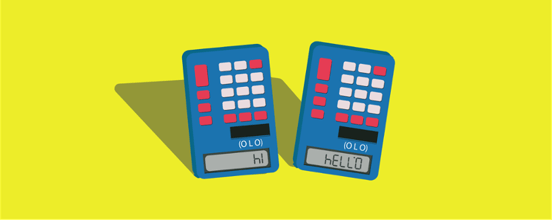ALI Staff | Published March 02, 2023
“Why do I need to know this?”
If you’re a teacher, you’ve probably heard this question more times than you can count.
It’s a challenge to bridge the gap between the math in your lessons and the real world your students live in. You want your students to see that math isn’t just a subject but a vital skill they’ll use throughout their lives.
In this blog, we’ll help you show your students how math connects to everyday life in exciting and meaningful ways.
We’ll discuss how math helps solve real-world problems, share relatable examples, and explore the impact of teaching math through practical applications.
By the end, you’ll be equipped with fresh ideas to engage your students and answer that ever-present question with confidence.

Math in the real world is so important that, often, students might not immediately notice its presence. We use math in everything from managing our schedules to planning for special events to cooking dinner.
Math is a vital tool for organizing, planning, and making sense of the world around us.
Beyond that, understanding math helps students build critical thinking skills, making them better problem-solvers. It enables them to approach tasks methodically and make informed decisions.
By appreciating how math is used in everyday life and beyond, students can see it as a valuable skill both in and out of school.
Let’s look at some specific examples to answer the question, 'What roles does math play in everyday life?’
These real-world applications demonstrate the practical value of math and can help students relate to the subject more easily.
Managing money effectively is one of the most important skills students can learn.
Budgeting, saving, and understanding interest rates all require a solid grasp of math. Whether tracking expenses or planning for future purchases, math helps students make informed financial decisions.
For younger students, you can set up a simple savings goal. Have them calculate how much they must save each week to buy a desired item.
For older students, introduce concepts like interest and percentages by discussing how savings accounts work. Show them how their money can grow over time– teaching both math and financial responsibility.
In the kitchen, math is essential for measuring ingredients and adjusting recipes.
Whether doubling a recipe or converting measurements, students use fractions, ratios, and basic arithmetic. This practical application reinforces their understanding of these concepts.
Use cooking as a fun way to teach fractions and measurements.
Bring in a simple recipe and ask your students to help adjust it. For example, if a recipe serves four but you need to serve eight, students can practice doubling the ingredients.
This makes math tangible and relevant to their daily lives.
Shopping involves a lot of math, from calculating discounts to understanding sales tax and how it affects the total cost of a purchase.
When students compare prices or calculate the total cost of their purchases, they apply their math skills in real-world situations, helping them see the immediate benefits of math in their lives.
For younger students, set up a play store in your classroom.
They can practice adding and subtracting prices, making change, and learning about money. For older students, incorporate more advanced elements like earning 'classroom money' to buy prizes.
Introduce discounts and sales tax to help them understand real-world shopping scenarios.
Planning a trip involves estimating travel time, calculating distances, and managing budgets.
These tasks require math skills such as addition, subtraction, and multiplication. When students understand how math helps with organizing travel, they appreciate its practical value.
For younger students, you might plan a virtual field trip where they calculate travel times, distances, and expenses.
For older students, introduce more complex scenarios. For example, have them calculate how long it would take to travel between two cities, given different modes of transportation.
They could also use geometry to find the shortest distance between two points. This not only helps students apply math skills but also demonstrates the practical importance of efficiency and planning in real-life travel situations.
Math is crucial in sports and health for tracking performance, calculating scores, and managing fitness routines.
Athletes use statistics to improve their performance, and fitness enthusiasts track their progress through measurements and goal-setting. This shows students how math supports a healthy lifestyle.
Teachers can highlight how athletes use math to track their performance in a PE class or after-school sport.
You can have students measure their heart rates, record their running times, and set fitness goals. This makes math relevant to their interests and shows its importance in maintaining a healthy lifestyle.
Effective time management relies heavily on math.
Students use math to create schedules, allocate time for tasks, and prioritize activities. Learning to manage time efficiently with the help of math can improve their productivity and reduce stress.
Discuss with your students how the school day is organized. Explain how long each lesson is and how the daily schedule is made. Encourage them to create their own schedules for homework and free time, helping them see how math can improve their time management skills.
By highlighting these applications for your students, you can inspire them to see that math is everywhere in their daily lives and engage more deeply with the subject.
Math is essential for daily life and a critical skill in various professional fields.
If you teach high school and older middle school students, show them how careers they’ve heard of use math. This will help them see its importance and relevance far beyond the classroom.
Here are some ways you can bring math to life:
Highlight how math trains the brain to think logically and solve complex problems.
Present puzzles or real-world problems that require math to solve, emphasizing how these skills are transferable to any career.
Encourage students to approach problems methodically, breaking them down into smaller, manageable parts.
This practice enhances their math skills and develops their overall analytical abilities, which are crucial in both academic and professional settings.
Take every opportunity to show your students how math is relevant to real-world careers and the diverse paths they can pursue.
Discuss various careers and how they rely on math. Invite professionals to speak about how they use math in their jobs or show video interviews.
Highlight less-obvious fields like graphic design, where geometry and proportions are key, or journalism, where statistical analysis is often used to interpret data and trends.
Emphasize that math is relevant in every career, from managing a business and making data-driven decisions to understanding technical details in creative industries.
This broad perspective helps students see the wide range of opportunities that math skills can unlock and understand that proficiency in math can enhance their success in any field they choose.
Teaching math through real-world applications can significantly enhance student engagement and understanding.
When students see the practical uses of math, they appreciate its value and relevance, making learning more interesting and meaningful.
By integrating math in real life applications into their lessons, teachers can transform students' perceptions of the subject.
This approach boosts engagement and understanding and equips students with valuable skills for their future careers, demonstrating that math is a crucial and practical tool in the real world.

In May 2023, Texas approved a transformative bill (House Bill 1605) that significantly impacts educational funding for...

Effective math strategies deepen students' understanding and enthusiasm for mathematics. These strategies not only...

Perhaps you’ve heard someone make the claim that “math is a language.”
Maybe you’ve made that statement yourself...